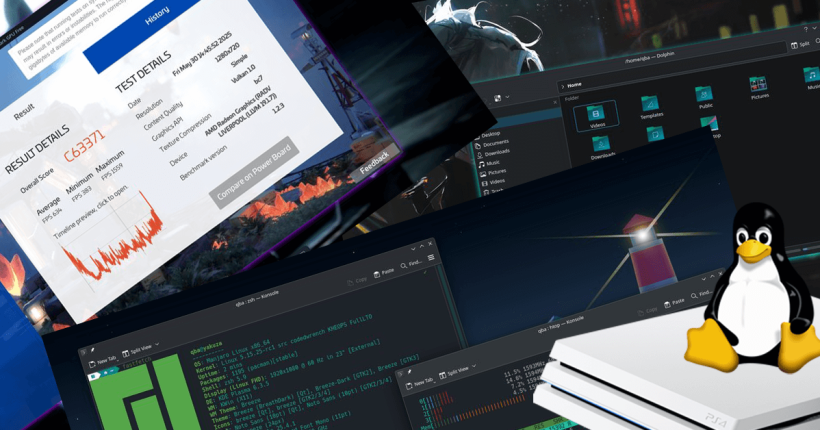
A very active member of the PS4Linux community and our forum member, elokuba is here with 4 latest gaming distros for PS4. The list includes EndeavourOS for PS4, CachyOS for PS4, Grauda Linux for PS4 and Manjaro For PS4, built from scratch. Over the past few months, he has been updating these distros and they have also been equipped with almost everything you’d need for Linux gaming on PS4.
Download
- EndeavourOS – pCloud (Check forum post for details and troubleshooting)
- CachyOS Final Fantasy v2 – Mega/Megaup (Check forum post for details and troubleshooting, especially bootargs.txt file)
- Garuda Linux for PS4 – Mega (Check forum post for details and troubleshooting)
- Manjaro for PS4 (built from scratch) – Mega (Check forum post for details and troubleshooting)
Login details
- EndeavourOS for PS4
- User: qba
- Password: ps4l
- CachyOS for PS4
- User: qba
- Password: loki
- Garuda Linux for PS4
- User: qba
- Password: loki
- Manjaro Linux for PS4
- User: qba
- Password: loki
Installation: How to install the gaming Linux distros on PS4?
If the archive size of the distro is more than 4GB, you will have to use the faster method for installation (contains video tutorial as well). Else, you can use the usual PS4 initram shell method.
Setup Linux gaming distros on PS4
Once the installation is complete, you can customise the distro to your liking. Here are a few things you might need soon after the installation.
Set up swap space (Optional, but recommended)
Setting up a proper swap space reduces the chance of crashes during gaming and other heavy tasks. So, I recommend you follow these steps to set up swap space before gaming on this distro.
- Open a terminal and type
su. It will ask for a password. Enter ps4. You should now have root access. - Next, type
cd /and press Enter. - Then, type
touch /swapfile. - Next, decide how much swap space you require. I suggest having 4GB to 8GB. But, this will depend on how much free space your USB drive has. Assuming, you want to have 8GB of swap, type
fallocate -l 8GB /swapfileand press Enter. - Then, type
chmod 600 /swapfileand press Enter. - Following that, type
mkswap /swapfileand press Enter. - Finally, type
swapon /swapfileand press Enter. - This swap will stick for the current session, but you will have to redo all these steps after a restart. To make this permanent, type
nano /etc/fstab. This will open the file, fstab in a text editor. - Use the arrow keys to scroll to the last empty line and type
/swapfile none swap sw 0 0. Then, press Ctrl+X followed by Enter. - Press Y when prompted with “Save modified buffer” and Enter.
- Confirm that the file name to write is /etc/fstab. Press Enter.
If this method doesn’t work, try this alternate swap creation method (second one in the section).
Conclusion
elokuba has more coming your way. Do check out the forums posts as linked under the Downloads section on this page to know more about his distros and to interact with him.


hello, a question for elokuba, how did you install the drivers? and where did you found them? i am interested because i wanted to make my own cachyos for linux
You may ask him any questions directly on the forum post as linked in the article.
Hi
Manjaro Linux is not available, when the Mega page opens it says ‘The file you are trying to download is no longer available’
I am totally new to Linux and a week ago decided Garuda was absolutely the right choice for my Reatan Ryzen Alloy 9 whatever the fuck minipc lol
I am soooo in love
Ra Ra Catppuccin winner of the Linux Dream
hey can you link me the drivers for download